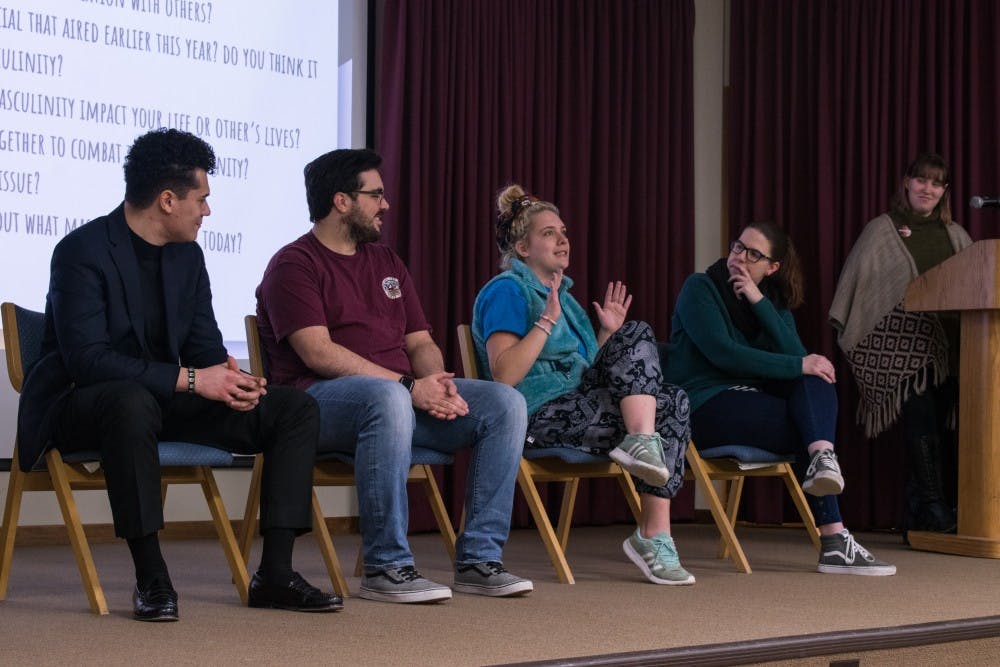Organization of Women Leaders holds second panel on toxic masculinity

Panelist (from left to right) Port Huron senior Mateo Savedra, Jenison junior Jacob Helm, St. Clair Shores junior Samantha Shriber and communications faculty Alysa Lucas discuss the topic of toxic masculinity Feb. 5 at the Bovee University Center Auditorium.
The Central Michigan University Organization of Women Leaders hosted a panel Feb. 5 in the Bovee University Center Auditorium. The event, titled “Conversations on Toxic Behaviors Part II," focused primarily on toxic masculinity and how it plays a role in society and relationships.
This was the second conversation on toxic masculinity organized by OWLs, and offered a different presentation with new perspectives from students and faculty.
"I just felt like toxic masculinity is relevant now, it's always been relevant, and as students and peers, we needed a space to have civil conversations about it," said OWLs Activism Chair Francesca Farzalo, who organized the event. "I hope that people took away that the boxes we're put into aren't permanent and aren't even necessary."
The event began with an introduction on toxic masculinity presented by Farzalo and OWLs President Emily Jones.
“I’m sure we’ve all heard of toxic masculinity, but really looking at what it is, it can present as suppressing emotions, masking distress, maintaining an appearance of hardness and violence as an indicator of power,” Jones said.
Before the panel convened, two videos on toxic masculinity were shared with attendees, including a TedTalk by Ben Hurst and “48 Things Men Hear In A Lifetime (That Are Bad For Everyone)." The videos helped set up the conversation that followed and introduced how toxic masculinity relates to feminism and intersectionality.
“The feminist movement isn’t about one group of people, it’s about ending sexism in all different forms for all different people,” Jones said. “This is one of the ways men experience sexism, so if we’re not having that conversation and trying to find solutions, it affects men, women, non-binary and trans folks and literally everyone.”
The panel consisted of communication and dramatic arts faculty Alysa Lucas, St. Clair Shores junior Samantha Shriber, Port Huron senior Mateo Savedra and Jenison junior Jacob Helm. Panelists discussed how toxic masculinity affects communication in relationships and consent.
“If men are taught and expected to initiate, they’re also the most likely to be rejected,” Lucas said. “I think that ties into toxic masculinity in a lot of ways when rejections aren’t accepted, and no one owes anyone anything, no matter who’s asking out who.”
The recent Gillette commercial, which stirred controversy and conversation on toxic masculinity, was also a topic of discussion.
“In my mind, it’s (Gillette) trying to get us to talk about the fact that they’re making a point, but one thing I think the commercial did well was (present) the idea that it is possible to break the chain of toxic masculinity and socialization,” Helm said. “The chain is able to be broken, it’s just up to individuals to work to break that chain.”
When panelists were asked to reflect on the impact of toxic masculinity, the conversation became a little more introspective and personal. The response varied depending on personal experiences, with Shriber reflecting on her family’s military background and Lucas recalling her past working with men as a manager in a movie theater.
“When men are placed in a box of masculinity, that automatically places other people into a box of femininity,” Lucas said. “I think toxic masculinity impacts everyone, and there are a lot of times, especially when people are younger, that they believe they have to participate in things to showcase that they are ‘the man’ or ‘the woman’ in the situation.”
“Boxes” defined by gender roles and stereotypes were a strong point of discussion during the event. Helm addressed the restrictiveness of boxes by sharing his own high school experience when choosing between musical theater and football.
“I had people on the football team (say), ‘you want to do theater, I thought only women and gay guys do that,’” he said. “The tipping point - I ended up choosing musical theater because it was more accepting - was when the coach said, ‘you can either be a man and play football or be a sissy and do theater’. And I said, ‘if this is what you thinking being a man is, I’d rather be a sissy.’”
The final subject addressed by the panel were ways to combat toxic masculinity and how to overcome the restrictions of toxic masculinity.
“When the playing field is level, it feels like you’re losing ground if you already have everything you want,” Savedra said. “If you make people realize that everyone loses (from toxic masculinity), people would be more willing to work things out."







